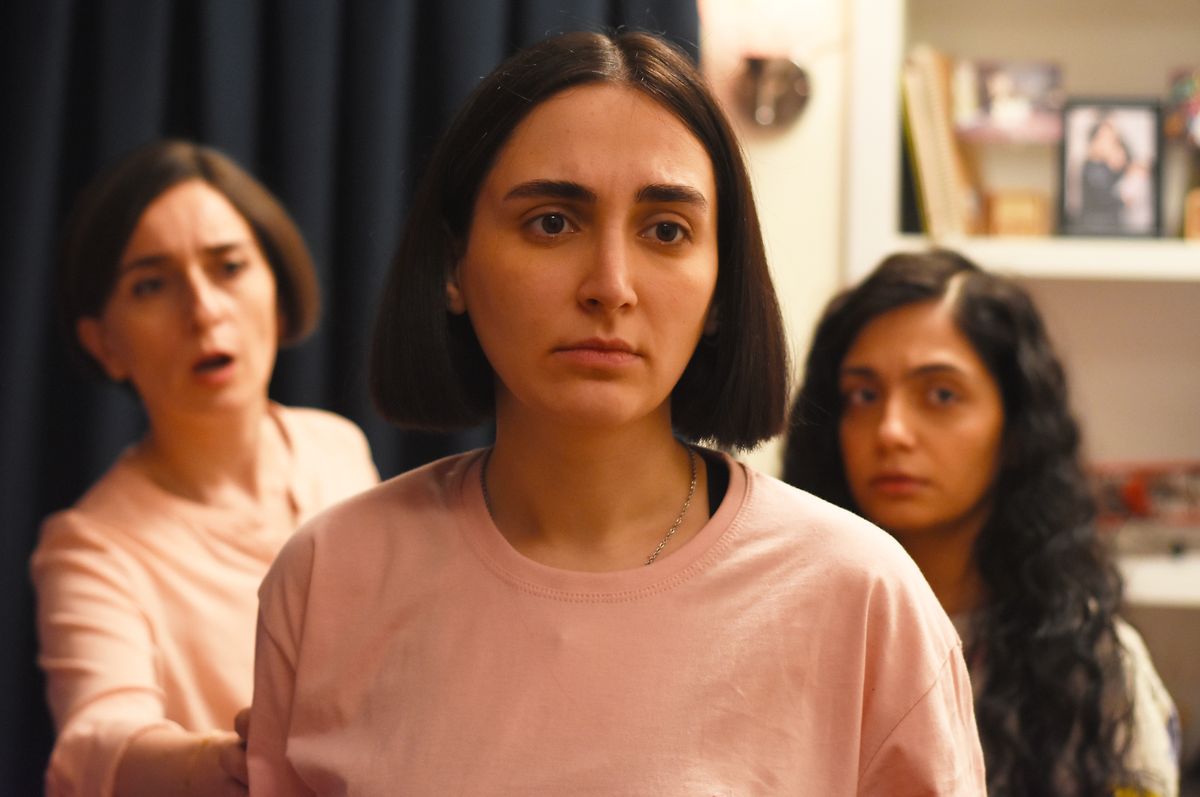Few countries are producing as riveting cinema as Iran is doing in the last 10-20 years. The inherent juxtaposition of a progressive population ruled by a conservative regime makes for constantly compelling cinema, whether it be about divorce, immigration, or serial killers, every film made there that the West ends up seeing is some of the best storytelling movies have to offer today. The Seed of the Sacred Fig continues that filmmaking excellence, boldly created at great peril so we can see what’s really happening in the country right now.
That’s no exaggeration: director Mohammad Rasoulof was driven out of Iran for making this movie. The story that so scared Iran’s leaders is about Iman (Missagh Zareh), a recently appointed investigating judge in the Revolutionary Courts of Iran. Iman and his wife Najmeh (Soheila Golestani) are very happy with this development. But there’s also signs of concern: Iman is given a gun to protect himself since this position isn’t very popular. As such, his family has to stay pretty isolated from the outside world, including his two university aged daughters Rezvan (Mahsa Rostami) and Sana (Setareh Maleki), who just learned about a woman named Mahsa Amini…
No wonder the Iranian government wanted to arrest Rasoulof so badly. He smartly turns The Seed of the Sacred Fig into a parable about generational and gender divides that are happening in Iran right now. On the one side you have Iman, who on the surface doesn’t seem like a bad guy; he’s happy at his chance to climb the societal ladder in Iran, and rightfully is fraught over the limited time he has delivering harsh, mostly life and death sentences for very young people at the request of the powers that be. But overworking and hours upon hours in court isolate and transform Iman slowly into a walking representation of the punishing force theocracies can have on their people. And on the other side are Rezvan and Sana, two daughters who love their time with their friends and chance to live their own lives. They see the overly strict penalties those friends endure simply being around violent protesters in the wrong place at the wrong time. And in the middle is the most interesting character in this tale, Najmeh, who has to deal with all the diverging, strong opinions from the people she loves and walk an impossible line between them to hold her family together. This inherent tension drives the movie, and interspersed with the story Rasoulof adds some of the real life cell phone footage of the Amini protests after her death, taking this fictional tale and turning it into a real life pseudo biopic of real conversations many Iranian families are having around dinner tables across their country.
But The Seed of the Sacred Fig is more than just an allegory. It’s a darn entertaining story, beginning to almost 3 hour end. The movie takes its time, setting up Iman’s life first then introducing us to the 3 women in his life, where we then spend most of the first hour and a half. For all the exciting protests going on outside, a lot of excitement and thrills are happening behind these closed doors and windows between this family of 4. Iman’s lengthy work disappearances let Najmeh allow the girls to grow on their own, though she tries to persuade them to understand her more conservative perspective. Like a good mom, Najmeh compromises, and lets the girls dress and talk how they want inside, and even gives them some room to grow and make mistakes and learn from them. But this untenable family situation breeds two separate lives, the female triad one and a more phony, short term one when Iman is home. In their house together the limited time the girls have with their father is wrought with as much tension as Iman feels in court, maybe more, as his daughters take apart his arguments with real life cell phone footage they’re receiving from people she knows, including well researched facts and rebuttals. Iman takes these feelings as insults on his character, turning him more and more paranoid as if the very lives the 3 women lead are filled with secrets designed to take away everything he’s worked for. Little strange events at home feed his paranoia, careening this family to some version of a disaster. The ending gets a little crazy, but thankfully Rasoulof finds the perfect last location and framing to land the incredibly exciting stressful emotional ride he takes us on.
By the end of The Seed of the Sacred Fig, I was sure I watched the Iranian movie child of High and Low and A Hero. If we have to sacrifice these incredible Iranian movies for a more peaceful open regime, that’s a sacrifice I can hope for. But I am thankful to all these brave actors, directors, and other artists, risking their lives and citizenship to speak truth to power. I am in awe of your bravery and promise to always listen with an open heart and and open mind.

